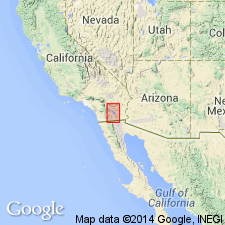
- Usage in publication:
-
- Ocotillo conglomerate
- Modifications:
-
- Original reference
- Dominant lithology:
-
- Conglomerate
- AAPG geologic province:
-
- Salton basin
Summary:
Pg. 28 (fig. 2), 24, pl. 2 (geol. map). Ocotillo conglomerate. Composed of gray granitic-pebble conglomerate. Overlies Borrego lacustrine clays, and, together with Brawley lake bed facies into which the conglomerate grades, forms youngest unit of Cenozoic in Imperial Valley. At type section, about 800 feet thick and conformable upon Borrego clays; near Ocotillo and eastward on south flank of San Felipe Hills anticlinorium, about 1,000 feet thick and conformable upon Borrego clays; northeastward from Ocotillo, overlaps Palm Spring and Imperial formations. In Mecca Hills south of San Andreas fault conglomerate ranges in thickness from knife edge to 900 feet and is unconformable on older formations; west of fault, about 2,500 feet thick and overlies Palm Spring red beds; to Indio Hills, about 2,100 feet thick and lies unconformably on Canebrake (new), Palm Spring, and Imperial formations and shows northwestward overlap. Age is early Pleistocene or late Pliocene.
Type section: in northern part of Borrego Badlands northeast of Borrego, Imperial Co., southern CA. Named from exposures near Ocotillo, [Imperial Co., southern CA].
Source: US geologic names lexicon (USGS Bull. 1200, p. 2800-2801).
For more information, please contact Nancy Stamm, Geologic Names Committee Secretary.
Asterisk (*) indicates published by U.S. Geological Survey authors.
"No current usage" (†) implies that a name has been abandoned or has fallen into disuse. Former usage and, if known, replacement name given in parentheses ( ).
Slash (/) indicates name conflicts with nomenclatural guidelines (CSN, 1933; ACSN, 1961, 1970; NACSN, 1983, 2005, 2021). May be explained within brackets ([ ]).

